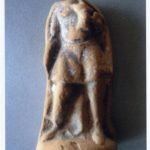July 17, 2018 — If you’ve started off on the wrong foot, grab tight to your phallic amulet.
This will only make sense if you are an ancient Roman.
Or if you visit Zadar’s Archeological Museum this summer.
Have you seen an owl? Be worried.
For ancient Romans, the winged killing machines were harbingers of misfortune — a belief still held in some parts of Dalmatia.
The Archeological Museum of Zadar will soon open an exhibit chronicling ancient Roman superstitions, some of which last to this day.
Like killer owls.
The exhibit, “Abrakadabra — Magic and Superstition in Ancient Rome”, will feature about 150 items used over 2,000 years ago to conjure strength, attract fortune and repel bad luck. It will remain on open until the end of the summer.
The museum is riding a wave of enthusiasm after previous exhibits about ancient Roman eroticism, sexual life, medicine and beauty aroused unexpected interest.
“I’ve been thinking for a long time about this topic, that I wanted to make public through the stories of everyday life of old Rome,” the curator and Museum’s Head of Antiquities Dr. Kornelija Guinio told Zadarski List.
Some of the items on display draw a direct line to the present.
For example: Horseshoes were good luck magnets, as they are today.
“Starting off on the wrong foot” harkens back to a Roman belief that one must not make his or her first step of the day with their left foot.
The mostly-agrarian Roman society also valued their crops so much, a law prohibited casting spells meant to ruin a harvest.
Bees were considered messengers of good fortune — of course.
The exhibit also unveils one overwhelming fact: Romans considered men’s genitals an antidote to nearly all of life’s ills. Phallus-shaped amulets were a veritable pocket knife of superstitious goodies, believed to ward off bad luck, accidents, illness and spells. Even doorbells (meant to ward off misfortune) were shaped like penises.
Though not all Romans held such beliefs. Much like today, there was a class divide.
While impoverished Romans and commoners followed agricultural superstitions and worshiped men’s genitals, emperors took their guidance from astrology and celestial bodies.
Guinio said she hopes the exhibit will “allow visitors to gain insights into the mysterious and comprehensive art of magic in ancient Rome.”
So go down to Zadar and see a lucky Roman wiener horseshoe.









